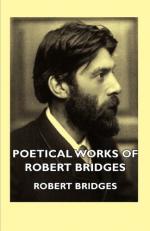|
This section contains 1,654 words (approx. 6 pages at 300 words per page) |

|
SOURCE: “The Testament of Beauty,” in The Nation, Vol. 130, No. 3371, February 12, 1930, pp. 193-96.
In the following review of The Testament of Beauty, Walton describes the poem as Bridges's attempt to reevaluate his beliefs in beauty and human spirituality in the face of a society that has changed dramatically since his youth.
Robert Bridges, Poet Laureate of England, was born in 1844; he has lived, therefore, through three literary periods and has seen three well-defined shifts of scene. As a young man he must have been influenced by all that concerned Alfred Tennyson in his poetical epitomizing of the Victorian Age: its religious doubt and insecure faith, its attempt at fortification against the scientific revolution, its moral primness and ugly industrialism. Later he endured the nineties, fin de siècle, a period of pessimism and sensualism whose main dogmas were Impressionism and Art for Art's Sake; and at last he...
|
This section contains 1,654 words (approx. 6 pages at 300 words per page) |

|


